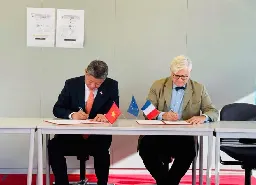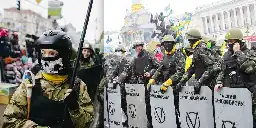Post the thing when you remember the thing because sane history & anthropology is scarce is some parts
It's so funny that rail in the EU is so close together and it doesn't properly connect internationally LMAO
Someone definitely used a monkey's paw or evil genie type wish to ask for international rail networks funded by the French government
Bombing Iran is certainly a unifying objective for imperialists. Those mountains will break the whole western world. You're living through it.
"What unfolded in Lebanon last week was something dystopian, but it wasn't a movie. It affected real people's lives."

cross-posted from: https://lemmy.ml/post/21086784
If anyone here freaks out about cooperation agreements with the west keep in mind these are several rungs below the cooperation with Laos, Cambodia, and China, VERY explicitly so
🌏🌎🌍🌏🌎🌍🌏🌎🌍🌏🌎🌍
☝️🤠💖 I love this freaking thing.
💢💢 If you don’t… 💢💢
🤯🔨🤠 Things could get bad. 🥰🚀🚀🚀🚀☢️
Are you seriously asking me if shooting missiles at military assets results in a negative trade on the attacking side?? Seriously?????
Okay but tianeptine is good it just shouldn't be sold as a gas station drug like kratom. It has nothing to do with heroin this is insane. They use it as an antidepressant here in Vietnam.
To solve the housing crisis we need to turn away from neoliberal doctrines and look towards solutions that actually work. Our own history, as well as the experiences of our contemporaries abroad, teach us that the only way to restore housing affordability is to create non-market housing alternatives...

cross-posted from: https://lemmy.ml/post/21085323
What are you even yapping about you complete lunatic LMAO? "Bro I'm totally on your side PLEASE BELIEVE ME!" first day on the job?
A shocking new poll shows that almost two out of three Jewish Israelis oppose criminal prosecution for soldiers suspected of gang-raping Palestinian detainees at the Sde Teiman torture facility.
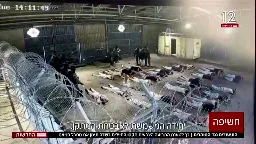
I'm actually interested in watching the first one just to see this musical, had zero interest in the franchise before.
The Hasbara hivemind seems to be speaking with a unified voice this evening.
Yeah you guys ask for a source when someone says fucking kids is wrong. Hard pass.
Keep your concern trolling about Reddiquette to yourself or risk wasting more of our precious time on this earth.
https://redlib.catsarch.com/r/NewsWithJingjing/comments/1fxa1ag/a_cbs_journalist_tried_to_selfimmolate_in/
My agenda is smashing that MFing 𝔖𝔥𝔞𝔯𝔢 𝔅𝔲𝔱𝔱𝔬𝔫. Get your neocon agenda, both-sidesing ass out of here.
City officials’ decision to consolidate city-run migrant shelters comes as the number of residents has dwindled and fewer asylum seekers are arriving in Chicago.
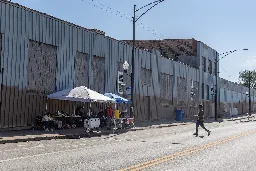
cross-posted from: https://lemmy.ml/post/21083330
"Go read" the Hudson Institute? RAND? What will the first page of Google bestow upon the next challenger?
You are going to need to come back with something other than NEOCON DRIVEL if you want me to take your quest to inject 🤓🇳🇺🇦🇳🇨🇪🧐 into my discourse seriously. "Did a little digging" always seems to include the first page of search engines that had their balls chopped off by the Alliance to Secure Democracy in 2022. I don't need live reports on your Google search journey!
Well yeah of course they do they're a feminist globohomo matriarchy which forcibly transitions cis gay men (who are highly reactionary, read Cockshott)
Dams across the country are aging, and also facing pressures from urban sprawl and intensifying floods wrought by climate change.

"You idiot! You didn't even hit any civilians!"
Yeah, yeah...
You're still not getting the north back kiddo.
I've yet to see any of you coming at me cite anything that isn't a Washington think tank. Why don't we try something other than begging Sᴏᴜᴛʜᴇʀɴ Bᴏʏ™ to use Associated Press/AFP sources, citing hardcore right wing neocon think tanks that appear first on Google search, and instead try asking Africans about what they think of China?
You don't even know how to find that information, do you? Post-Ukraine Google has you thumbfingering RAND Corp and The New York Times into my mentions. You are one stinky boy!
Tehran, IRNA – The Islamic Resistance in Iraq has conducted a drone attack against the occupied Golan Heights in southwestern Syria.


cross-posted from: https://lemmy.ml/post/21081940
> https://xcancel.com/afgmeh/status/1842687969729069479#m

cross-posted from: https://lemmy.ml/post/21072661
> Reflecting on the mass protests that recently shook Kenyan society from top to bottom, Joel Mukisa argues that we must go much further than a choiceless democracy to find answers. A systematic questioning of the underlining political and economic structures underpinning the choices on offer must be undertaken. ** > > By Joel Mukisa > > If you asked a think-tank team leader, a social sciences Professor at Nairobi University if they anticipated the scale and popularity of the protests that rocked East Africa’s economic powerhouse Kenya, only a few months ago many honest people would simply retort, NO! > > The protests that rather appeared spontaneous characterized mainly by a young generation of Kenyans known as Gen Z protesting the Finance Bill (an annually produced document that lays out the government’s fiscal strategy) that would introduce a cocktail of new taxes on essential and basic commodities. This comes on the heels of an economy recuperating from the COVID-19, Ukraine War, the decpreciation of the Kenyan shilling, massive unemployement, massive debt and a divisive election. > > The protests were characterized by incidents of violence among the deaths, shootings by Kenya’s Police, deployment of the Armed Forces, looting, plunder and the most dramatic, setting the national parliament ablaze. This all came as a surprise especially to Africanists that have viewed or tounted Kenya as a radical break with what it stereotypically labelled African. > > Kenya is characterized as democratically stable and having strong democratic institutions. So the force meted out by Kenya’s police or even such rabid dissent with a leader of William Ruto’s stature and credentials can seem to be confusing. These tribeless protests can not be understood under the banal templates of “ethnic madness.” This is why I argue we must understand this protest movement as merely examples of something broader than even the protestors were saying which is characteristic of contemporary social movements. > > Nomeclature > > It may sound bourgeoisbut before we begin to understand the systemic shifts and questions the protest generated, we should understand it by the name under which it moves. The protests begun under the #OccupyParliament. Which was symbolic of the need to take a sovereign democratic institution and its symbolic power into the hands of the majority. This was after and slightly before parliament debated and passed the Finance Bill. > > Despite objections raised and wide mass distemper against the law, parliamentarians of the Kenya Kwanza (the main party of governement) hurriedly passed the law with amendments from the minority. Government claimed that it had listened and hence the amendments. The tone shifted with Gen Z clarifying that they wanted: “Reject Not Amend.” The Amendment signalled the state’s ability to offer more if push came to shove and many urged those protesting to up the ante, and their gamble paid when Kenya’s President William Ruto declined to ratify the impugned Bill sending it back to Parliament. > > It is in this context of democracy’s failure that #OcuppyParliament must be understood. > > \#OccupyParliament is not a fresh lexicon in the Antropocene. It first emerged in 2011 with the #OccupyWallStreet as a left-wing anarchist movement against economic inequality, corporate greed and the influence of money in politics that had begun in Zuccotti Park, in New York City’s financial district, and lasted from September 17 to November 15, 2011. > > How can we better situate #OcuppyParliament without reducing it to an analogous analysis but rather steeping it within both its national, regional and international histriocity. > > We can glean from the foregoing that from the onset #OcuppyMovements are mobilized online, overcoming differences emanating from historical injuries such as race, tribe (in the African context) and class, gender (not so much) as bodies assemble on the streets to make the point that life is nolonger liveable. > > These protests made known a hard truth that unity does not precede political praxis; it is produced through political struggle. They bypass established democratic institutions that they think are part of the mess. They are leaderless hence less prone to compromise and represent a shift in ways of political organization. > > This spectre started in 1978 with the Soweto uprising that changed the conventional understanding of struggle from armed to popular struggle. Ordinary people stopped thinking of struggle as something waged by professional fighters, armed guerrillas, with the people cheering from the stands, it continued to Tahrir square in Cairo in 2011 when Hosni Mubarak was forced to resign. Little wonder the protesters hope that for their mission to be complete, Ruto too, must resign and that’s why after him ceding to their demands and refusing to sign the law, they continued to protest insisting that he too resign under the hashtag #RutoMustGo. > > The Metaphor > > CNN journalist Larry Madowo interviewed two people who have been subject of humor and caricature. He asked them why they were on the streets. What particular grievances they had against the state that perhaps prompted them to come to the streets? The answers shifted from incoherent and incomphrensible to muffled and inarticulate hinting at a systemic problem from which the Finance Bill is the starting blocks through which mass hysteria could be immediately articulated. > > Kenya is part of what has been termed as the African crisis or African Tragedy. The foregoing are adjectives for endemic poverty, high unemployement rates, inflation, corruption, deterioting terms of trade, cronynism and debt dependence. These were in recent times compounded by the Corona Virus pandemic, a war in Ukraine, among an array of other international factors. In such a fix with a near financial crunch just pending, the Kenyan leadership was forced onto the IMF who imposed the usual straitjacket. > > The IMF insists that the crises are budgetary, i.e, that government expendintures have excedded revenues and the demand for foreign exchange outstripped supply. The short term antidote is to freeze wages, cut social programs and subsidies. Secondly, increase production from the supply side by transfering resources from the classes which have a tendency to consume to those that have a tendecy to invest. The recommendations at times include regressive tax regimes on the middle class. A middle class that been vanishing since 2008 during the Kibaki administration. It’s the same middle class on whom the new taxes would be imposed – joined by their dependant subaltern kith and kin on the streets in protests that were reminiscent of the 20th century bread riots that too, opposed IMF and World Bank Austerity. > > Kenya’s path on this neo-liberal financing model must be one of the most ambitious on the continent and has been sustained across decades without proper scrutiny of its nefarious, cataclysmic implications such as the wide and dispropriate levels of inome inequality that has been an enabler in the reproduction of a political caste or aristocracy from which “alternatives” in the multi-party dispensations are to be chosen. The political economist Thandika Mkandwire refered to this as choiceless democracy given that it restricted sets of policy options available to African states, which find themselves strangled by a skewed international economic structure, the neoliberal economic and security demands of donors, and the pervasive presence of foreign NGOs and development agencies. > > Therefore the inarticulate protesters referred to above speak against this context of an all powerful elite and under an ever contracted political landscape that benefits a few. The concrete example should be how the opposition had fielded amendments to this regressive bill in parliament that it later withdrew under the auspieces of a protest gaining momentum. > > If the current state of democracy is limited in its scope to tackle the pervasive issues that bedevil us today and institutions of the global economy such as IMF and World Bank remain unfazed as we stand in the hot African sun to elect leaders, then democracy as it has been sold to us has failed. > > So do we do as part of the #OcuppyParliament movement? Do we continue reforming the political system to which this mess is greatly attributable. As Zizek reminds us here, Marx’s key insight remains as pertinent today as it ever was: the question of freedom should not be located primarily in the political sphere – i.e. in such things as free elections, an independent judiciary, a free press, respect for human rights. Real freedom resides in the ‘apolitical’ network of social relations, from the market to the family, where the change needed in order to make improvements is not political reform, but a change in the social relations of production. We do not vote concerning who owns what, or about the relations between workers in a factory and their bosses. Such things are left to processes outside the sphere of the political, and it is an illusion that one can change them by ‘extending’ democracy – say, by setting up ‘democratic’ banks under people’s control. > > The democractic illusion may thus be the real impediment to real time transformation of the social relations of production and the start of a conversation on the politics of redistribution that has been supplanted by the discourse of recognition that has atomized emanicipatory struggles. > > Ruto is not the problem, the problem is sytemic and Kenyans should use this moment as an opportunity to seach for a new mode of democracy that is emancipatory. To return to the start of this blogpost, the answer as to why no one could have predicted this kind of event is simple, it required imagination, a break with the past for which most social sciences are totally incapable. > > A version of this blogpost appeared as ‘Kenya’s protests as metaphors’ on 17 July 2024 in The Independent (Uganda). > > Joel Mukisa is a radical researcher with interests in political economy, agrarian question, human rights, philosophy and psycho-analysis****.**
cross-posted from: https://lemmy.ml/post/21073833

cross-posted from: https://lemmy.ml/post/21080081
> https://xcancel.com/BenjaminNorton/status/1842789775968759982#m
The French president calls for an “arms embargo” on the Israeli regime over the war on Gaza, prompting a fiery backlash from the regime’s prime minister.
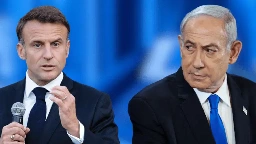
Tehran, IRNA-Syrian media confirmed on Saturday night that Israel has bombed the Qusayr area in the suburbs of Homs, a border town with Lebanon.
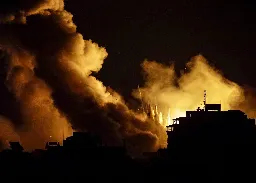
October 5, 2024 María Corina Machado has not made any public appearances for almost 40 days. After ambivalent statements about her “clandestinity,” she has been accused of preparing to leave the co…
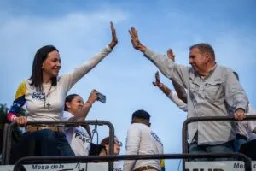
María Corina Machado has not made any public appearances for almost 40 days. After ambivalent statements about her “clandestinity,” she has been accused of preparing to leave the country. She insists she is in Venezuela but has not given any proof of this. She affirms, as did Edmundo González when he was applying for asylum in Spain, that she will not leave the country.
Isolation and loss of traction\ Her appearances have been telematic from closed places. Occasionally, she is seen distraught, despite her efforts to show confidence and forcefulness in arguments.
Their last “national mobilization,” scheduled for September 28, dispensed with the plan of mass gatherings and opted for the tactical resource of the “swarm.” The result was an atomized activity without assistance or relevance. In other words, the organization of opposition mobilization collapsed and demonstrated its weakness.
On social media, where the “queen bee” has ruled by riding on the favors of algorithms, she is increasingly criticized for a promise of “cashing out” (cobrar) that has translated into nothing.
The core of Machado’s political destiny lies precisely in that premise of “cashing out” or making an effective regime change, as she has incessantly promised. The mood changed drastically after Edmundo González fled to Spain through the asylum he requested and communicated to Machado just one day before boarding a plane bound for Madrid.
There has been no institutional breakdown within Venezuela. After various calls from both politicians \[Machado and González], no military or police authority has taken up arms, and no preponderant element within the security sphere has mobilized in support of their agenda.
The big private economic actors organized in the main business associations have not actively participated in the postelectoral diatribe. They have made a few statements calling for “peace, stability, and work.” They do not participate in the diatribe and, therefore, have not played an open role in Machado’s insurrectional project.
Recently, the government set up a new space for dialogue with Venezuelan opposition parties. The notable absence was that of the Democratic Unitary Platform (PUD) that supported Edmundo González. González, Machado, and the PUD had published a statement in which they indicated that a real dialogue would only be possible if they participated so that Maduro would give up power and begin a “transition.”
The clearly defiant message demands that Chavismo hand over power. Yet, that message resonates differently with the other opposition parties. Machado and González will once again repeat the strategy of abstentionism. They will pressure the parties not to work towards the next elections. They will call them “scorpions” and will try to contain, by force of pressure, further ruptures in the already fragile image of the anti-Chavismo consensus.
Obstacles and opposing forces\ What are Machado’s real capabilities to materialize a regime change? With what force is Machado capable of demanding that Maduro begin an imaginary transition?
The leader lacks the basic features that could lead to a coup. If we look at the internal picture, there is no high-impact street mobilization, no support from economic actors, and no institutional breakdown in the military. She also does not have the support of all the opposition, and the “leader” is “in hiding.” That is, internally, there is no possibility of “cashing out” in sight.
The only real options for Venezuela’s extremist opposition are in the hands of factors outside the country.
Outside Venezuela, the US mercenary Erik Prince, together with former Venezuelan military deserters, has raised funds to finance a new private coup. This would not be a novelty given the failed “Operation Gideon” of 2020 by Jordan Goudreau’s contractor, Silvercorp, with support from the DEA.
Now, various leaders of the “Ya Casi Venezuela” platform are accusing each other of fraud and individual profiteering from the funds raised. So far, the funds raised seem to be insufficient for a mercenary mission on a significant scale in a place like Venezuela, which, according to its demographic proportion, is the most militarily equipped country in the region.
It is very difficult to know the actual dimension of the organization belonging to Prince and his associates because the flow of information—false or real—is part of the game in the shadows of intelligence and counterintelligence.
Meanwhile, the governments of the so-called “international community,” or rather, the United States and its allied countries, have taken a position not to recognize the re-election of President Nicolás Maduro. Yet so far, they remain reluctant to accept Edmundo González as “president-elect” in self-exile.
Machado, along with her allies and media operators, have launched a campaign to renew “maximum pressure” on Venezuela’s oil activities.
Venezuela has risen to third place among crude oil exporters to the United States. Meanwhile, military and geopolitical tensions in West Asia create a major obstacle for Washington, limiting its ability to apply more illegal sanctions or revoke OFAC licenses.
License 41-A was automatically extended for another six months without any statements from the US government on the matter.
Clearly, any possibility of calculation to effect a regime change, coup, or assassination in Venezuela lies in the designs and actors of the external front, meaning that these options are not in Machado’s hands.
The leader has probably exhausted all her resources and possibilities internally. Time and all elements of real power are against her.
By Kit Klarenberg – Oct 3, 2024
A little-noticed report published September 19th by JINSA laid out how the Empire will be on the defence, and at grave disadvantage, in all-out hot war with Iran.
On October 1st, Iran launched scores of missiles at the Zionist entity, in response to the murder of Hezbollah leader Hassan Nasrallah, among many brazen provocations and escalations targeting the Resistance in recent months. Voluminous footage of key Israeli infrastructure, including military and intelligence sites, being comprehensively flattened by the Islamic Republic’s inexorable onslaught has circulated widely, amply contradicting predictable claims emanating from Tel Aviv and Washington that the blitzkrieg was successfully repelled by Western air defence systems.
It is the largest, most devastating attack on the Zionist entity in its 76-year history. The full impact is not yet apparent. While US officials worriedly warned hours in advance they possessed “indications” Iran was preparing to attack “Israel”, the incursion’s timing, scale, and severity caught all concerned by surprise. Washington dispatching thousands more troops across West Asia in the days prior, explicitly in “Israel’s” defence, was evidently no deterrent to Tehran.
That deployment came replete with a supposedly rock-solid Pentagon pledge to come to the rescue should the Islamic Republic seek to repeat the historic, wide-ranging drone and rocket barrage to which it subjected the Zionist entity in April. Department of Defense apparatchiks boldly declared they and Tel Aviv alike were “even better prepared for a new Iranian attack” than last time round. The ease with which “Israel’s” purportedly impregnable Iron Dome was bested exposes this braggadocio as hopeless hubris at best, dangerous delusion at worst.
The Islamic Revolutionary Guard Corps is ever-cautious, and has acted with extraordinary restraint since the 21st century Holocaust erupted in Gaza. Some analysts have interpreted this implacable self-control, and Tehran’s lack of immediate backlash against acts such as the audacious assassination of Hamas leader Ismail Haniyeh on Iranian soil, as not merely rigid reluctance to escalate into all-out war with “Israel” and its Western backers, but an inability to respond at all. Tel Aviv’s unprecedented October 1st battering should dispel any such inference.
Senior Israeli politician Yaiv Golan, who returned to Israeli Occupation Force (IOF) service following October 7th, has branded Iran’s latest assault a “declaration of war” against the Zionist entity. Notorious Benny Gantz boasts Tel Aviv “has capabilities that were developed for years to strike Iran, and the government has [our] full backing to act with force and determination.” Meanwhile, IOF spokesperson Daniel Hagari declares, “There was a serious attack on us and there will be serious consequences.”
The IRGC appears to have calculated such threats and pronouncements are as empty and meaningless as the Pentagon’s pledge to be “better prepared” for a future Iranian strike. At the very least, the Islamic Republic fears no Anglo-Israeli retaliation to its latest broadside. That may mean Tehran has grounds to believe the balance of power in the region, and in any future large-scale conflict with the Zionist entity and West, has irrevocably tipped in favour of the Resistance.
Eerily, a little-noticed report published September 19th by the Jewish Institute for National Security of America (JINSA), a powerful and shadowy Zionist lobby organisation, inadvertently reached this same conclusion. It laid out in forensic detail how the Empire will be on the defence, and at grave disadvantage, in all-out hot war with Iran. Along the way, a blueprint for Resistance victory was plainly sketched. With Tehran having thrown down a gauntlet on October 1st, we could now be seeing that plan being put into action.
‘Gaining Overmatch’ Titled U.S. Bases in the Middle East: Overcoming the Tyranny of Geography, JINSA’s report was authored by former CENTCOM commander Frank McKenzie, who oversaw the Empire’s disastrous retreat from Afghanistan. It appraises the viability, value, and force projection capabilities of current US military installations throughout West Asia, focusing on Bahrain, Jordan, Kuwait, Qatar, Saudi Arabia, and UAE. The findings are stark, calling for an immediate overhaul of American basing across the region:
“Our current basing structure, inherited from years of haphazard decision-making, and driven by divergent operational and political principles, has yielded installations that are not optimally situated for the most likely threats of today and the future in the region.”
Despite mentioning “threats” in plural, JINSA’s sole focus is the Islamic Republic. While a myriad of issues with the Empire’s modern day positioning throughout West Asia are identified, the “most important” conclusion drawn is that Washington’s “current basing array detracts from our ability to deter Iran and fight them effectively in a high-intensity scenario.” McKenzie is nonetheless at pains to portray Tehran as somewhat feeble and vulnerable:
“The Iranians have no army that can be deployed as an invading force. They have a small and ineffective navy, and in practical terms, no air force. Their missile and drone force, though, is capable of gaining overmatch against many of its neighbors…they can deploy more attacking missiles and drones than can be defended against.”
Handing out Sweets: How British Propaganda Steers Events in West Asia
As such, JINSA notes, “a theater-level war with Iran would be a war of missiles and drones,” and Tehran’s April 13th attack on “Israel” was a “comprehensive demonstration of Iranian operational design.” The IRGC sought to overwhelm the Zionist entity’s air defences and radar systems with waves of low-cost drones and cruise missiles, to “make it difficult for Iron Dome or Patriot to engage the ballistic missiles that followed.”
Given what went down on October 1st, McKenzie correctly forecast that the April strike would “probably remain the basic template for large-scale Iranian attacks.” He appraised the effort – “at least conceptually” – as “a sound one,” from which “there are lessons for all to learn.” The most pressing and “obvious” takeout for JINSA was that, “for the defenders of the Gulf, it will be a war of strike aircraft, tankers, and air and missile defense…and here is the problem”:
“These aircraft are largely based at locations along the southern coast of the Arabian Gulf…an artifact of planning against Russian incursions in the 1970s, and the Iraq and Afghanistan campaigns of the early decades of this century. They are close to Iran, which means they have a short trip to the fight…but that is also their great vulnerability. They are so close to Iran that it takes but five minutes or less for missiles launched from Iran to reach their bases.”
The “thousands of short-range missiles” Iran possesses are also a key negative “factor”, offering “no strategic depth.” While an F-35 fighter jet “is very hard to hit in the air…on the ground it is nothing more than a very expensive and vulnerable chunk of metal sitting in the sun.” Refuelling and rearming facilities on US bases in West Asia “are also vulnerable, and they cannot be moved.” Most damagingly of all:
“These bases are all defended by Patriot and other defensive systems. Unfortunately, at such close range to Iran, the ability of the attacker to mass fires and overwhelm the defense is very real.”
In closing his roadmap to Tehran’s victory, McKenzie bitterly laments, “It is hard to escape the conclusion that our current basing structure is poorly postured for the most likely fight that will emerge.” The Empire “will not be able to maintain these bases in a full-throated conflict, because they will be rendered unusable by sustained Iranian attack.” Imperial overreach in West Asia has now fallen victim to “the simple tyranny of geography.” And all along, the Islamic Republic has been taking rigorous notes:
“The Iranians can see this problem just as clearly as we do, and that is one of the reasons why they have created their large and highly capable missile and drone force.”
‘Nothing but force’ For all the JINSA report’s doom and gloom, McKenzie does express some optimism – of the most fantastical, self-deceived kind. For one, he suggests Iran cannot threaten the Empire’s “carrier-based aviation” capabilities. Still, he concedes “there aren’t enough carriers, and therefore naval aviation will probably not be the central weapon in a fires war with Iran.” The former CENTCOM chief also conveniently overlooks AnsarAllah’s recent crushing defeat of the US Navy during Operation Prosperity Guardian, which unambiguously exposed the redundancy of US aircraft carriers altogether.
Elsewhere, McKenzie declares that the Empire “needs to move aggressively to develop basing alternatives that demonstrate that it is prepared to fight and prevail in a sustained high-intensity war” with Tehran, and therefore “overcome unfavorable basing geography.” One radical solution proposed by the JINSA report is to “consider basing in Israel”. US military presence in Tel Aviv has already been slowly growing over recent years. While largely unacknowledged and downplayed, it has proven incredibly controversial every step of the way.
In September 2017, the IOF announced the arrival of America’s first permanent military installation in the Zionist entity. Such was the backlash domestically and regionally, that officials in Washington raced to deny this was the case, prompting a major cleanup of IOF websites referencing the site. Any move to create a fully-fledged US base in “Israel”, explicitly for war-fighting purposes, would inevitably spark even greater outcry, and be seen as a major escalation by the Resistance, demanding a drastic response.
Such an eventuality undoubtedly didn’t occur to the former CENTCOM chief. His analysis is hazardously unsound and fallacious in other areas too. On top of “Israel’s” “geographic advantages”, he praises Tel Aviv’s “powerful, proven air and missile defense capability.” It was this “competence”, combined with “US and allied assistance, and the cooperation and assistance of Arab neighbors”, that ensured Iran’s April strike on the Zionist entity was a “failure”, McKenzie muses.
He appraises this group effort, which supposedly prevented Iran from delivering decapitation strikes against the Zionist entity’s military and intelligence structure, as “in every measurable way…a remarkable success story.” If McKenzie’s view was shared by the Pentagon, this may explain why the US was so caught off guard by, and ill-prepared for, Tehran’s recent bludgeoning of “Israel”. Far from an embarrassing cataclysm, the April effort was a spectacular success, which exposed “Israel’s” fatal weaknesses, and reshaped West Asia forever.
Far from wanting too deliver a death blow, the Islamic Republic sought to deescalate via a measured, well-advertised show of strength, while avoiding a wider response. In the process, the IRGC demonstrated that if it wished, in future it could successfully bypass the Iron Dome, and would wreak immense destruction. Then, a “new equation” was spelled out by a Corps Commander:
“If from now on the Zionist regime attacks our interests, assets, personalities, and citizens, at any point we will attack against them.”
This message was evidently not received in corridors of power in Brussels, London, Tel Aviv, and Washington. Whether it will finally be comprehended now that Tehran has struck once again deep into the Zionist entity’s putrid heart remains to be seen. As Russian military strategist Igor Korotchenko once observed, “this Anglo-Saxon breed understands nothing but force.”
(Al Mayadeen – English)
Recent calls for the use of boycotts, divestment, and economic sanctions against Israel may seem to stand in tension with another position widely held on the left: the condemnation of economic…
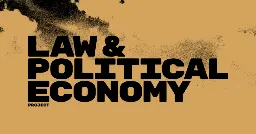
cross-posted from: https://lemmy.ml/post/21073970
> 09.30.24 > > Jeena Shah (@jeenashahesq) is an Associate Professor at the CUNY School of Law > > As Ntina Tzouvala has recently argued on this blog, a political-economic understanding of genocide can help explain what is unfolding in Gaza. It shows that the genocide should not be seen as an exceptional or isolated event, but as a violent tool to expedite what decades of settler apartheid couldn’t achieve on its own. It also elucidates why the solidarity efforts of the past two decades, particularly centered around “boycott, divestment, and sanctions” (BDS), transcend mere symbolism. Indeed, as recent student uprisings have stressed, BDS stands as a crucial instrument that, had it been more widely employed by the international community in support of broader Palestinian resistance, could have potentially averted the ongoing genocide. > > Such calls for sanctions, however, may seem to stand in tension with another position widely held on the left: the condemnation of the United States’ deployment of economic sanctions as effectively neo-imperial warfare by other means. These justified critiques frequently overlook the important role that sanctions have played, first in support of the anti-apartheid struggle in South Africa, and today in support of Palestinian liberation. This unintentional oversight has, unfortunately, provided fodder for those who accuse current BDS campaigns of unfairly singling out Israel as a target, while ignoring the multitude of other states that commit grave human rights abuses. > > However, as I argue in a pair of forthcoming articles, we can resolve this apparent tension by looking closely at how anticolonial resistance movements of the 1960s and 1970s analyzed this dual role of “sanctions” — as both a neoimperial tool and decolonial tool. As they attempted to transform international law from a structure whose raison d’etre was justifying and managing imperialism to one that centered on self-determination – what I call “anticolonial lawmaking” – they developed a robust right of self-determination that offers a legal framework for understanding the role of sanctions in both maintaining and undermining imperialism. > > This right of self-determination went beyond merely seeking political independence from direct colonial rule; it also aimed to safeguard that independence from other forms of imperial domination. While independence from direct colonial rule requires divestment and sanctions of distinctly colonial relations, independence from imperial domination forbids the use unilateral economic sanctions against formerly colonized states by former colonizing powers and their settler states. To ascertain the difference between situations demanding the imposition of sanctions and situations prohibiting them, then, anticolonial lawmaking requires an analysis of the political economic operation of colonialism, settler apartheid, and neoimperialism. Sanctions, on this view, should not be seen as a stable, immutable tool, but as protean, operating differently depending on the political economic context. > > ## Sanctions Against Colonial Structures > > “Colonialism” is the process by which a state unilaterally annexes a territory to which a people belong without the responsibility to govern or provide for such a people on par with the state’s own citizens. As Prabhat Patnaik and Utsa Patnaik have argued, the political-economic function of colonialism is to achieve a one-way transfer of wealth in the form of land, labor, or money from the colony to the metropole. This is often referred to as the “colonial drain.” Central to this process is the forced or coerced separation of a people from the land to which they belong in order to ensure the metropole’s access to the land and to destroy the colonized people’s ability to sustain themselves, requiring them to resort to working as laborers for the metropole. > > In a globally integrated economy, colonizing powers primarily benefit from such extraction through support from the international community via trade, investment, and finance. Anticolonial lawmaking thus understood that the independence from colonial rule necessitated a duty of all states to cease all relations, including economic relations, that help the colonial power benefit from their colonized territory. Rather than serve to punish, retaliate, or deter, such sanctions aim to prevent the colonizing powers from economically benefiting from the land and peoples under its colonial rule, in order to undercut the rationale for such rule to persist. > > How does this perspective apply to systems of apartheid? While the conventional understanding of apartheid today typically confines it to a human rights concern of “institutionalized racial discrimination,” anticolonial lawmaking viewed settler apartheid as a structure that arises from the evasion of decolonization and continues as a variant of colonialism—and thus a proper target for decolonizing sanctions. > > Settler apartheid states initially gain sovereign power by virtue of an imperial power’s termination of its colonial rule. But not wanting to include a majority indigenous population in its polity on equal terms — and where genocide and removal are no longer politically viable — apartheid is all that remains as the preferred method of settler rule. At first, settler states engage in what is known as petty apartheid: the formally enshrined hierarchy of citizenship in the settler state, maintained by legally-enforced segregation. Under petty apartheid, the settler state effectively creates a colony within its borders, through which harms like racialized wage differentials or the concentration of racialized indigenous peoples in segregated areas are better understood as wealth and land extraction. > > However, to avoid criticism of the fundamentally anti-democratic nature of petty apartheid, the settler state gradually moves towards grand apartheid: the creation of bantustans, or semi-sovereign structures within the landmass of the colonized territory. By expelling the indigenous peoples to bantustans, the settler state thereby denationalizes them and can thus deny them equal political power or provisions without running afoul of democratic norms. Since these newly created states cannot exercise the full powers of sovereign statehood, and are instead circumscribed by the settler state’s authority, bantustans are best understood as colonies of the settler state. Petty apartheid and grand apartheid thus function together to maintain distinctly colonial relations. And sanctions that target such relations aim to end the settler apartheid state’s ability to benefit from both its petty and grand apartheid, a step towards the ultimate goal: reunification of the entire landmass as a singular sovereign state with lands restored to the dispossessed indigenous peoples and full equality. > > ## Neo-Imperialism and Sanctions > > Gaining freedom from such colonial structures is, while necessary to self-determination, far from sufficient. While the era of decolonization ended the dominance of a particular mode of imperialism, i.e. colonialism, the post-war era also witnessed the United States and Western Europe fully reassemble imperialism by the 1990s without the need for colonialism. They did so by deploying international economic law to impose a singular political economy of capitalism upon all newly decolonized states – a political economy that inherently requires imperialism. > > The contemporary reconstruction of European imperialism in the form of neo-imperialism is only legible through an understanding of capitalism’s inherent need for imperialism to ensure its continued operation. As Patnaik and Patnaik explain, without imperialism’s facilitation of ongoing access to cheap land and labor and new markets in what becomes constructed as the periphery, the inherent tendency of the rate of capital accumulation in the metropole to fall would either cause inflation, which would reduce the value of the currency in which capitalists’ wealth is held, or undermine the global monetary system, which would in turn further impede capital accumulation. In other words, imperialism is necessary to prevent capitalism from descending into crisis. > > Prior to the widespread political decolonization won by anticolonial resistance movements in the postwar era, imperialism primarily served this function through colonial taxation, an efficient mechanism for direct wealth extraction and to ensure ongoing access to cheap land and labor and new, captive markets. After decolonization, however, the United States and Europe would instead need to take advantage of the economic vulnerability of newly decolonized states to secure such extraction. These states emerged from colonization without reparations and with overwhelming debt inherited from colonial rule. On top of this, they were left with a colonial structuring of production on their landmasses, primarily through large-scale plantation agriculture and extractive industries, that would disadvantage them in global trade relations. Though newly decolonized states tried to reverse these patterns of production to assert economic independence, these colonialism-structured economies were further entrenched through the US-led Green Revolution and the asymmetries imposed by the 1947 General Agreement on Tariffs and Trade (GATT). > > These economic vulnerabilities were most dramatically exploited by the United States in manufacturing the Third World Debt Crisis of the 1980s, which caused such rapid capital flight from newly decolonized states that it was, as Joseph Halevi and Yanis Varoufakis describe, “more effective” in breaking the efforts of newly decolonized states to assert economic independence “than any military operation.” Specifically, debt replaced the system of colonial taxation to become the chief mechanism by which the U.S., along with other former colonizing powers, imposed a new form of imperialism. > > Like colonial taxation, debt allows lenders to dictate the pattern of production on the debtor’s landmass. In the aftermath of the 1980s Third World Debt Crisis, the IMF and World Bank imposed conditions on loans that required borrowing states to allow for the free entry of foreign capital. And once let in, borrowing states needed to prevent sudden outflows of foreign capital that would throw their economies into acute crisis. As a result, debtor states were compelled to move from responding to the needs of local populations to maintaining “creditworthiness” – meaning imposing policies oriented towards the needs of foreign capital – so as not to upset the confidence of the investors. This system of control was reinforced by trade and investment agreements that former colonized countries entered into in order to participate in the global economy. Together, these mechanisms have compelled formerly colonized states to implement measures that have helped maintain U.S./EU access to cheap land and labor and captive markets. > > To sustain this imperialist framework, the compliance of otherwise recalcitrant states is ensured through the use of disciplinary mechanisms, such as warmaking and sanctions. Considered more “efficient” than warmaking, sanctions have been the most effective when designed to exploit the current system of debt-based imperialism in a dollarized global economy. Specifically, U.S./EU sanctions against formerly colonized states have been able to fully exploit the asymmetrical nature of dollarized debt-based imperialism by taking the form of financial and secondary sanctions, resulting in long-lasting catastrophic consequences. > > In seeking freedom from such imperial domination, anticolonial lawmaking initially sought to reconstruct the global political-economic order in a way that would impede their subjugation. Attempting to create a “New International Economic Order,” anticolonial lawmaking identified the imperialist metropole-periphery relations embedded in the global political economy as the source of their ongoing underdevelopment and shared a common goal of shedding their peripheral status. The 1980s Third World Debt Crisis defeated this project. > > In the face of this loss, newly decolonized states instead emphasized the importance of protections to their juridical sovereignty from the disciplinary mechanisms deployed by the capitalist metropoles to enforce the imperialist metropole-periphery relationship. Legal protections that attach to statehood — specifically, sovereign equality and non-intervention — were thus redefined as protections against imperialist encroachment, including specifically economic sanctions imposed by former colonizers and their settler states like the U.S. > > Prohibitions on economic sanctions cannot, then, be understood apart from the role that they play in a particular global political economy of a given time. Such an analysis reveals why the right of self-determination prohibits the unilateral deployment of economic sanctions against formerly colonized states, even where those sanctions are purportedly deployed to protect human rights. > > \\\* > > The foregoing analysis, which I lay out in greater detail in my forthcoming articles, attempts to recover a central insight from the period of anticolonial lawmaking: that the right of self-determination offers a legal framework for understanding the role of sanctions in both maintaining and undermining imperialism. With this in hand, the left need not be reticent in its calls for BDS against Israel and other colonial and settler apartheid powers, while still condemning the imposition of such economic coercion against formerly colonized states.
Recent calls for the use of boycotts, divestment, and economic sanctions against Israel may seem to stand in tension with another position widely held on the left: the condemnation of economic…
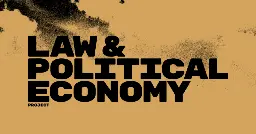
09.30.24
Jeena Shah (@jeenashahesq) is an Associate Professor at the CUNY School of Law
As Ntina Tzouvala has recently argued on this blog, a political-economic understanding of genocide can help explain what is unfolding in Gaza. It shows that the genocide should not be seen as an exceptional or isolated event, but as a violent tool to expedite what decades of settler apartheid couldn’t achieve on its own. It also elucidates why the solidarity efforts of the past two decades, particularly centered around “boycott, divestment, and sanctions” (BDS), transcend mere symbolism. Indeed, as recent student uprisings have stressed, BDS stands as a crucial instrument that, had it been more widely employed by the international community in support of broader Palestinian resistance, could have potentially averted the ongoing genocide.
Such calls for sanctions, however, may seem to stand in tension with another position widely held on the left: the condemnation of the United States’ deployment of economic sanctions as effectively neo-imperial warfare by other means. These justified critiques frequently overlook the important role that sanctions have played, first in support of the anti-apartheid struggle in South Africa, and today in support of Palestinian liberation. This unintentional oversight has, unfortunately, provided fodder for those who accuse current BDS campaigns of unfairly singling out Israel as a target, while ignoring the multitude of other states that commit grave human rights abuses.
However, as I argue in a pair of forthcoming articles, we can resolve this apparent tension by looking closely at how anticolonial resistance movements of the 1960s and 1970s analyzed this dual role of “sanctions” — as both a neoimperial tool and decolonial tool. As they attempted to transform international law from a structure whose raison d’etre was justifying and managing imperialism to one that centered on self-determination – what I call “anticolonial lawmaking” – they developed a robust right of self-determination that offers a legal framework for understanding the role of sanctions in both maintaining and undermining imperialism.
This right of self-determination went beyond merely seeking political independence from direct colonial rule; it also aimed to safeguard that independence from other forms of imperial domination. While independence from direct colonial rule requires divestment and sanctions of distinctly colonial relations, independence from imperial domination forbids the use unilateral economic sanctions against formerly colonized states by former colonizing powers and their settler states. To ascertain the difference between situations demanding the imposition of sanctions and situations prohibiting them, then, anticolonial lawmaking requires an analysis of the political economic operation of colonialism, settler apartheid, and neoimperialism. Sanctions, on this view, should not be seen as a stable, immutable tool, but as protean, operating differently depending on the political economic context.
Sanctions Against Colonial Structures
“Colonialism” is the process by which a state unilaterally annexes a territory to which a people belong without the responsibility to govern or provide for such a people on par with the state’s own citizens. As Prabhat Patnaik and Utsa Patnaik have argued, the political-economic function of colonialism is to achieve a one-way transfer of wealth in the form of land, labor, or money from the colony to the metropole. This is often referred to as the “colonial drain.” Central to this process is the forced or coerced separation of a people from the land to which they belong in order to ensure the metropole’s access to the land and to destroy the colonized people’s ability to sustain themselves, requiring them to resort to working as laborers for the metropole.
In a globally integrated economy, colonizing powers primarily benefit from such extraction through support from the international community via trade, investment, and finance. Anticolonial lawmaking thus understood that the independence from colonial rule necessitated a duty of all states to cease all relations, including economic relations, that help the colonial power benefit from their colonized territory. Rather than serve to punish, retaliate, or deter, such sanctions aim to prevent the colonizing powers from economically benefiting from the land and peoples under its colonial rule, in order to undercut the rationale for such rule to persist.
How does this perspective apply to systems of apartheid? While the conventional understanding of apartheid today typically confines it to a human rights concern of “institutionalized racial discrimination,” anticolonial lawmaking viewed settler apartheid as a structure that arises from the evasion of decolonization and continues as a variant of colonialism—and thus a proper target for decolonizing sanctions.
Settler apartheid states initially gain sovereign power by virtue of an imperial power’s termination of its colonial rule. But not wanting to include a majority indigenous population in its polity on equal terms — and where genocide and removal are no longer politically viable — apartheid is all that remains as the preferred method of settler rule. At first, settler states engage in what is known as petty apartheid: the formally enshrined hierarchy of citizenship in the settler state, maintained by legally-enforced segregation. Under petty apartheid, the settler state effectively creates a colony within its borders, through which harms like racialized wage differentials or the concentration of racialized indigenous peoples in segregated areas are better understood as wealth and land extraction.
However, to avoid criticism of the fundamentally anti-democratic nature of petty apartheid, the settler state gradually moves towards grand apartheid: the creation of bantustans, or semi-sovereign structures within the landmass of the colonized territory. By expelling the indigenous peoples to bantustans, the settler state thereby denationalizes them and can thus deny them equal political power or provisions without running afoul of democratic norms. Since these newly created states cannot exercise the full powers of sovereign statehood, and are instead circumscribed by the settler state’s authority, bantustans are best understood as colonies of the settler state. Petty apartheid and grand apartheid thus function together to maintain distinctly colonial relations. And sanctions that target such relations aim to end the settler apartheid state’s ability to benefit from both its petty and grand apartheid, a step towards the ultimate goal: reunification of the entire landmass as a singular sovereign state with lands restored to the dispossessed indigenous peoples and full equality.
Neo-Imperialism and Sanctions
Gaining freedom from such colonial structures is, while necessary to self-determination, far from sufficient. While the era of decolonization ended the dominance of a particular mode of imperialism, i.e. colonialism, the post-war era also witnessed the United States and Western Europe fully reassemble imperialism by the 1990s without the need for colonialism. They did so by deploying international economic law to impose a singular political economy of capitalism upon all newly decolonized states – a political economy that inherently requires imperialism.
The contemporary reconstruction of European imperialism in the form of neo-imperialism is only legible through an understanding of capitalism’s inherent need for imperialism to ensure its continued operation. As Patnaik and Patnaik explain, without imperialism’s facilitation of ongoing access to cheap land and labor and new markets in what becomes constructed as the periphery, the inherent tendency of the rate of capital accumulation in the metropole to fall would either cause inflation, which would reduce the value of the currency in which capitalists’ wealth is held, or undermine the global monetary system, which would in turn further impede capital accumulation. In other words, imperialism is necessary to prevent capitalism from descending into crisis.
Prior to the widespread political decolonization won by anticolonial resistance movements in the postwar era, imperialism primarily served this function through colonial taxation, an efficient mechanism for direct wealth extraction and to ensure ongoing access to cheap land and labor and new, captive markets. After decolonization, however, the United States and Europe would instead need to take advantage of the economic vulnerability of newly decolonized states to secure such extraction. These states emerged from colonization without reparations and with overwhelming debt inherited from colonial rule. On top of this, they were left with a colonial structuring of production on their landmasses, primarily through large-scale plantation agriculture and extractive industries, that would disadvantage them in global trade relations. Though newly decolonized states tried to reverse these patterns of production to assert economic independence, these colonialism-structured economies were further entrenched through the US-led Green Revolution and the asymmetries imposed by the 1947 General Agreement on Tariffs and Trade (GATT).
These economic vulnerabilities were most dramatically exploited by the United States in manufacturing the Third World Debt Crisis of the 1980s, which caused such rapid capital flight from newly decolonized states that it was, as Joseph Halevi and Yanis Varoufakis describe, “more effective” in breaking the efforts of newly decolonized states to assert economic independence “than any military operation.” Specifically, debt replaced the system of colonial taxation to become the chief mechanism by which the U.S., along with other former colonizing powers, imposed a new form of imperialism.
Like colonial taxation, debt allows lenders to dictate the pattern of production on the debtor’s landmass. In the aftermath of the 1980s Third World Debt Crisis, the IMF and World Bank imposed conditions on loans that required borrowing states to allow for the free entry of foreign capital. And once let in, borrowing states needed to prevent sudden outflows of foreign capital that would throw their economies into acute crisis. As a result, debtor states were compelled to move from responding to the needs of local populations to maintaining “creditworthiness” – meaning imposing policies oriented towards the needs of foreign capital – so as not to upset the confidence of the investors. This system of control was reinforced by trade and investment agreements that former colonized countries entered into in order to participate in the global economy. Together, these mechanisms have compelled formerly colonized states to implement measures that have helped maintain U.S./EU access to cheap land and labor and captive markets.
To sustain this imperialist framework, the compliance of otherwise recalcitrant states is ensured through the use of disciplinary mechanisms, such as warmaking and sanctions. Considered more “efficient” than warmaking, sanctions have been the most effective when designed to exploit the current system of debt-based imperialism in a dollarized global economy. Specifically, U.S./EU sanctions against formerly colonized states have been able to fully exploit the asymmetrical nature of dollarized debt-based imperialism by taking the form of financial and secondary sanctions, resulting in long-lasting catastrophic consequences.
In seeking freedom from such imperial domination, anticolonial lawmaking initially sought to reconstruct the global political-economic order in a way that would impede their subjugation. Attempting to create a “New International Economic Order,” anticolonial lawmaking identified the imperialist metropole-periphery relations embedded in the global political economy as the source of their ongoing underdevelopment and shared a common goal of shedding their peripheral status. The 1980s Third World Debt Crisis defeated this project.
In the face of this loss, newly decolonized states instead emphasized the importance of protections to their *juridical *sovereignty from the disciplinary mechanisms deployed by the capitalist metropoles to enforce the imperialist metropole-periphery relationship. Legal protections that attach to statehood — specifically, sovereign equality and non-intervention — were thus redefined as protections against imperialist encroachment, including specifically economic sanctions imposed by former colonizers and their settler states like the U.S.
Prohibitions on economic sanctions cannot, then, be understood apart from the role that they play in a particular global political economy of a given time. Such an analysis reveals why the right of self-determination prohibits the unilateral deployment of economic sanctions against formerly colonized states, even where those sanctions are purportedly deployed to protect human rights.
\\\*
The foregoing analysis, which I lay out in greater detail in my forthcoming articles, attempts to recover a central insight from the period of anticolonial lawmaking: that the right of self-determination offers a legal framework for understanding the role of sanctions in both maintaining and undermining imperialism. With this in hand, the left need not be reticent in its calls for BDS against Israel and other colonial and settler apartheid powers, while still condemning the imposition of such economic coercion against formerly colonized states.
The restoration of capitalism in the Soviet Union, and the collapse of communism in the USSR, had a far more horrific cost than most in the West know, or can even conceive.
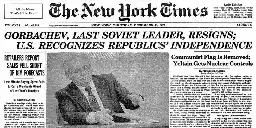
[!](https://substackcdn.com/image/fetch/f_auto,q_auto:good,fl_progressive:steep/https%3A%2F%2Fsubstack-post-media.s3.amazonaws.com%2Fpublic%2Fimages%2Fc399b6bd-0829-4135-9e1f-61f6b1ef0df5_1316x936.png)
The New York Times December 26, 1991, front page. Source: National Security Archive, “The End of the Soviet Union 1991”
While I work on a new original posting that I believe readers will find fascinating, I’m sending out this important article I’ve adapted from my archives. Originally published in January 2009 at my old Blogspot blog, Invictus, and updated in 2021, the article concerns the holocaust that ensued from the overthrow of the Soviet state and its replacement by capitalist restorationists. Its reposting is important, I believe, as it concerns the truth behind the overthrow of the Soviet Union, and the terrible human cost that the West’s “liberal democratic” campaign against communism entailed. This is not emphasized in Western media, or even most alternative media, for reasons that seem to me obvious.
The defeat of the Soviet workers state was engineered from within the Soviet Communist Party bureaucracy itself, in league with or with covert support of U.S. intelligence services, the Pentagon and the State Department, all of which had conducted a concerted campaign aimed at undermining the Soviet state since the late 1940s. There is much that one can criticize about the leadership of the old Soviet Union, but this article was not written as an analysis of the dissolution of the USSR. It is about the cost of disassembling the socialist superstructure of the society and replacing it with capitalist market forces.
It is interesting to consider that one of the chief architects of capitalist restoration within the Soviet Union, Anatoly Chubais, was until 2022 one of Vladimir Putin’s advisors and government-appointed officials. Chubais fled to Israel after opposing Russia’s invasion of Ukraine, itself a response to the ever-Westward press of U.S./NATO militarism.
A now-classic 1998 article by Janine R. Wedel at The Nation, “The Harvard Boys Do Russia,” described Chubais’s influence:
> The architect of privatization was former First Deputy Prime Minister Anatoly Chubais, a darling of the U.S. and Western financial establishments. Chubais’s drastic and corrupt stewardship made him extremely unpopular. According to The New York Times, he “may be the most despised man in Russia.
“Essential to the implementation of Chubais’s policies was the enthusiastic support of the Clinton Administration and its key representative for economic assistance in Moscow, the Harvard Institute for International Development \[HIID],” Wedel added.
> Chubais, committed to “radical reform,” vowed to construct a market economy and sweep away the vestiges of Communism. The U.S. Agency for International Development (U.S.A.I.D.), without experience in the former Soviet Union, was readily persuaded to hand over the responsibility for reshaping the Russian economy to H.I.I.D….
The full article is very much worth reading, as it goes into great detail. It also describes the contributions of other important figures in this debacle, including Harvard professor Jeffrey Sachs; “Yegor Gaidar, \[Boris] Yeltsin’s first architect of economic reform”; Clinton’s Under Secretary of the Treasury for International Affairs, Lawrence Summers (who was yet another Harvard professor); and “billionaire speculator George Soros,” among others.
[!](https://substackcdn.com/image/fetch/f_auto,q_auto:good,fl_progressive:steep/https%3A%2F%2Fsubstack-post-media.s3.amazonaws.com%2Fpublic%2Fimages%2Fff1ea253-aa78-4725-852a-cfa365f93b5c_846x1064.png)
“Anatoly Borisovich Chubais (born 1955) is a Russian politician” \[translated from Russian] — Source: Council.gov.ru, 1917, CC BY 4.0, via Wikipedia
Wedel’s article began: “After seven years of economic ‘reform’ financed by billions of dollars in U.S. and other Western aid, subsidized loans and rescheduled debt, the majority of Russian people find themselves worse off economically. The privatization drive that was supposed to reap the fruits of the free market instead helped to create a system of tycoon capitalism run for the benefit of a corrupt political oligarchy that has appropriated hundreds of millions of dollars of Western aid and plundered Russia’s wealth.”
The wealth was plundered. Socialism was destroyed. And the cost? Beyond anything experienced in any Western society this side of World War Two.
For this repost I have quietly fixed some broken links and corrected some small errors or typos. One broken link could not be fixed and necessitated a bit of discussion in this latest version of the article. A few other small edits have been made for readability’s sake, including the addition of subheads. I have added some commentary, including an interesting quote by Masha Gessen. I also tweaked the article’s conclusion, without hopefully doing too much damage to what I wrote in the original. The link to the 2009 article is at the beginning of this introduction.
[!](https://substackcdn.com/image/fetch/f_auto,q_auto:good,fl_progressive:steep/https%3A%2F%2Fsubstack-post-media.s3.amazonaws.com%2Fpublic%2Fimages%2F25c423b4-1142-4431-8f25-b08354c38056_588x434.png)
“The White House, the then-Russian Supreme Council building in Moscow, the capital of Russia, is seen just after it was set ablaze by tank shelling during the Moscow Riots.” — The “riots” were a civil conflict between those who opposed the dissolution of Soviet Communism and the new capitalist state run by Boris Yeltsin, backed by the United States and internal counter-revolutionary forces. The picture was taken on October 4, 1993, by “Bergmann at Japanese Wikipedia - Own work (original source on jawp: ja:File:ベールイドーム.jpg)” — Linked at Wikipedia.— CC BY 3.0
With Israel’s genocide in Gaza and murderous assault on Lebanon, perhaps the world has become so inured to mass death that the following story will merit little comment or outrage, even if the story did make the back pages of the New York Times some years ago. An important January 2009 Lancet study, "Mass privatisation and the post-communist mortality crisis," confirmed what has been known but little discussed in recent years: millions of people, mostly men of employment age, died as a result of the effects of the "shock therapy" transition from a collectivized to a privatized economy in Russia and other formerly "communist" states in East Europe.
According to the *Times *article, by 2007 "the life expectancy of Russian men was less than 60 years, compared with 67 years in 1985." Back in 2001, a UNICEF study had already claimed 3.2 million unnecessary deaths due to capitalist restoration. The Lancet study, authored by David Stuckler, MPH, Lawrence King, PhD, and Martin McKee, MD, cited other figures, with up to "10 million missing men because of system change." As a result, adult mortality rates soared, up almost 13% in Russia, with much of the increase attributable to the mass unemployment that followed the collapse in state enterprises.
The study noted, "the Russian population lost nearly 5 years of life expectancy between 1991 and 1994." Other factors affecting the disastrous increase in the death rate included poor health care, rising HIV rates, higher alcoholism and drug addiction rates, as well as the effects of acute psychosocial stress, massive corruption, impoverishment, rising social inequalities, and social disorganization.
This was a disaster with an epic scope, yet it hardly ever factors into discussions of Russia in the mainstream press or academia. This kind of silence feels like something more than uncaring. It feels like a deliberate “forgetting.” Moreover, the guilt of the U.S. and its allies in helping bring about this tragedy is great, and sooner or later, there will be some kind of reckoning for it.
“People kept dying”
A 2014 New York Review of Books article by Masha Gessen captured the awful reality of post-Soviet Russia to a visitor who knew Russia from its communist past.
> Sometime in 1993, after several trips to Russia, I noticed something bizarre and disturbing: people kept dying. I was used to losing friends to AIDS in the United States, but this was different. People in Russia were dying suddenly and violently, and their own friends and colleagues did not find these deaths shocking. Upon arriving in Moscow I called a friend with whom I had become close over the course of a year. “Vadim is no more,” said his father, who picked up the phone. “He drowned.” I showed up for a meeting with a newspaper reporter to have the receptionist say, “But he is dead, don’t you know?” I didn’t…. > > The deaths kept piling up. People—men and women—were falling, or perhaps jumping, off trains and out of windows; asphyxiating in country houses with faulty wood stoves or in apartments with jammed front-door locks; getting hit by cars that sped through quiet courtyards or plowed down groups of people on a sidewalk; drowning as a result of diving drunk into a lake or ignoring sea-storm warnings or for no apparent reason; poisoning themselves with too much alcohol, counterfeit alcohol, alcohol substitutes, or drugs; and, finally, dropping dead at absurdly early ages from heart attacks and strokes.
The effects of neo-liberal "shock therapy" on Russia and other East European countries (Russia being the hardest hit) were also felt by the children of the region. According to the UNICEF study noted above, tuberculosis rates rose by 50%; 150,000 children were added to the public care rolls (while overall population was dropping by millions); there were high levels of child malnutrition, and the number of children under age 5 fell by one-third. This was not just a jolt of "shock therapy," it was a social tsunami that devastated the region.
“Shock Therapy”
According to The Lancet, the more rapid the rate of privatization, the higher the death rate.
> Radical free-market advisers argued that capitalist transition needed to occur as rapidly as possible. The prescribed policy was called shock therapy, with three major elements: liberalisation of prices and trade to allow markets to re-allocate resources, stabilisation programmes to suppress inflation, and mass privatisation of state-owned enterprises to create appropriate incentives. When implemented simultaneously, these elements would cause an irreversible shift to a market-based economy.... Although a direct cause and effect relation cannot be ascertained and a detailed discussion of their roles is beyond the scope of this Article, all these findings can be linked, in some way, to mass privatisation programmes.
Of some interest is economist Jeffrey Sachs' own critique of the privatization programs and the changes he helped bring about with the dissolution of the Soviet Union. As early as 1994, Sachs wrote defensively, “Contrary to recent commentary, ‘shock therapy’ did not fail in Russia. It was never tried.” From Sachs’ point of view, the necessary Western financial aid never arrived, which could have made the “shock therapy” some kind of success. Sachs seems to have not understood that it was the policy of the United States to truly strangle the former Soviet Union, in an effort to snuff out any embers of revolution or socialism that might remain. The goal was untrammeled exploitation of the vast riches of the Russian state. Sachs was the capitalist version of the “useful idiot.”
As the U.S. economy teeters on the edge of free-fall \[as it seemed to me in 2009, when I was originally writing this], due to the unbridled policies of financial deregulation, and an evisceration of the tax base through so-called "trickle-down" economics with its massive tax cuts to the very rich, we should all ponder, with awe and great sadness, the final denouement of the Cold War, with its frenzy of capitalist restorationist policies in the old Soviet Union, and the tremendous human cost it involved.
It is also important in understanding where Russia is politically today, i.e., what were the social circumstances that produced the Putin regime. Ever since the contrived Georgia-South Ossetia conflict in 2008, it has appeared that the military-industrial complex of the U.S. is looking to find new "enemies," should the public taste for the "Global War on Terror" lessen, and fatigue increase over the crimes and disasters of the wars in Iraq and Afghanistan. \[As we can see, subsequent to 2009, the U.S. developed its anti-Russia efforts into a full-scale proxy war over Ukraine.]
Perhaps most of all, the sheer horror of the loss of life, the human tragedy of the return of "democracy" (in its free enterprise garb) to the former Soviet Union, is what we need to ponder. The truth behind the privatization policies of economists like Harvard-educated Jeffrey Sachs — who according to his own website is now “the Director of the Center for Sustainable Development at Columbia University, where he holds the rank of University Professor, the university’s highest academic rank” — has been hidden for years now behind glibly optimistic statements of economic progress in now-capitalist Russia.
Take for example this summary of a 1997 article in the Journal of Comparative Economics on "Bank privatization in post-communist Russia," \[broken link] which is typical of the way the changes in Russia have been reported by the dominant social and educational Western elite:
> The privatization of Zhilsotsbank of Russia demonstrates that the process of privatization can contribute to the eradication of the government's role in the corporate governance of banks. Incumbent bank managers obtained control rights over new private banks following Zhilsotsbank's decentralized privatization. The swift eradication of government from direct ownership of numerous banks, combined with broad licensing rules, has enabled the Russian banking industry to be over 75% private. Mosbusinessbank, a big commercial bank formed from 26 Zhilsotsbank branches, is one of the most profitable banks the old state banking system has produced.
[!](https://substackcdn.com/image/fetch/f_auto,q_auto:good,fl_progressive:steep/https%3A%2F%2Fsubstack-post-media.s3.amazonaws.com%2Fpublic%2Fimages%2Fae44ef1c-7ab5-4ead-b8eb-032081de9c8b_600x378.png)
Screenshot of a bank card for Mosbusinessbank. Source: Colnect.com
At least, that’s what the summary said back in 2009. Today, the link is broken (I’ve left it in for documentary purposes; sadly, there was no backup at Internet Archive.) But the abstract of the article is available online today and makes much the same point, with perhaps an embarrassed tip of the hat to something untoward (“instability”) in the post-communist Russian banking sector.
> The rapid removal of government from direct ownership of many banks, in combination with liberal licensing policies, has created a Russian banking sector that is more than 75% private. The banking environment that has evolved has fostered innovation and increased efficiency, along with significant instability in the system.
In the original summary, there is not a word on the social cost of this increased profitability. It’s not clear what the published abstract means by “significant instability in the system.” The article is under paywall, and I don’t feel like paying to see what the authors mean by such instability. The point is, they are fans of private enterprise, and praise the "innovation and increased efficiency” that comes with capitalist control of the banking sector. I still detect no understanding of the massive social and human cost to all this.
World Historical Truths
In fact, the social disaster in Russia due to privatization and the restoration of capitalism in Russia is barely known or understood in the U.S., outside a sense that gangsterism was increased thereby. Indeed, Russian mafia types play an outsized role in the spy dramas of modern U.S. television.
The truth about world history since the end of World War II has largely been kept from the U.S. population, e.g. the recruitment of Nazi war criminals into U.S. government research programs, including the intelligence agencies; the mass murders in the 100,000s by U.S. allies in Korea (with U.S. connivance); the secret budget of U.S. intelligence agencies and the extent of the latter's covert actions around the globe; and the CIA's mind control project with its enlistment of top levels of social, medical and psychological personnel throughout the 1950s-1970s, and the secret medical experiments upon these programs involved.
My own work has in recent years concentrated on exposing the U.S. covert use of biological weapons during the Korean War, and the cover-up of that crime.
The level of trust in what the U.S. government says is very low right now, thanks to the crimes of recent administrations. The Biden administration was the inheritor of the policies of the Obama administration. The latter sent mixed messages about what it how it wished to handle the checkered past record of the United States.
On one hand, the Obama people promised an open government and transparency, even as they censored pictures of U.S. torture and refused to release the full Senate report on the CIA’s rendition and torture program. Openness is still the unreliable mantra of the Biden administration, and I assume would be the same for a Harris administration. Today, “openness” and “transparency” are considered by many to be code-words for government hypocrisy and lies.
For all his bluster about the “deep state,” Donald Trump did very little to enhance governmental transparency. For his part, Obama determined that his administration would “look forward” and not backwards when it came to former administration crimes.
As we consider the pressing need to hold the U.S. to account, no matter what administration is in power, we might reflect upon the famous words of Nobel Prize-winning author William Faulkner: "The past is never dead. It's not even past." Shakespeare made essentially the same point hundreds of years earlier: "What’s past is prologue."

